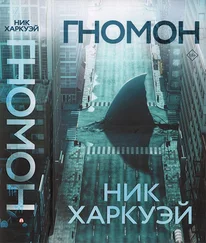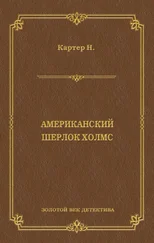He slid forward and felt the ground drop away, ducked his head and rolled close behind the nearest stack of heroin. It was heroin, thank God; someone had been kind enough to label it in neat black print, and ‘thank God’ because that meant it wasn’t important that it was sweating and he wasn’t about to be vaporised. And he could do this.
He pulled a conventional flashbang from his belt and tossed it to his right, waited a moment and then went left because ninety-five per cent of the population is right-handed and prefers to shoot, as it were, on the forehand. In the enclosed space of the cave, the blast was even more intense, and he expected it to drive the shadow gas away down the tunnel. Instead the cloud seemed to bow and ripple, passing the force through itself and shuddering before rolling back along the walls and resuming its position with a jellied shiver which looked altogether too much like a wink. He moved while they were deaf and blind, staying low. Overwhelming enemy forces, stated objectives impossible. Sitrep: total goatfuck .
He let the moment teach him its logic, felt the world fall into shapes in his head.
A moment later they came forward to where he had been. They used a classic fire-and-movement line, each man halting to provide cover for the next. It looked pretty enough, but they were all still too fuzzy from the impact of the flashbang to aim well, and while you could get away with firing into the tunnel, firing those weapons into the walls of this room would be unpredictable and dangerous. They could easily end up shooting one another. In fact, the odds greatly favoured it, because there were so many more of them than there were of him. That should make them unwilling to fire, make them hesitate, but only if they were good enough to realise it. He didn’t know whether they were that good, to hold to common sense here, now, with a king’s ransom in heroin and a demon in the room. He thought probably not. He left them to it, his mind clear and swift.
Old objectives: crash the party, induce urination in the enemy, depart. Job done, to a great extent, and the whole thing would have been hilarious without the drug stash or the weapons fire. Leave it behind. It’s irrelevant now.
New objectives: secure the boy’s departure, avoid capture, escape. He had probably managed the first already, although he had to make room for a scenario in which his friend was hovering with the door open like a getaway driver. Factor it in. This is the landscape. The best plan will flow downhill. The last one was the problem. It was not enough to get back to Brighton House in one piece. A brief survey of the armoury records would expose him. A probe of the boy’s costume purchases would do the same. Forensics, probably, would confirm it all, and if this was a government-level operation none of that was off the table. He could only survive if the question was simply never asked. He had a small advantage there in that attacking a fortified drug hideout by himself was very much not a Lester Ferris thing to do. As evidenced by the fact that he hadn’t done it, not intentionally. He had done something else and it had turned into that. Even he himself had not known he was going to do it. If he’d known what Pechorin and the others were up to in here, he would have left well alone.
Well, no, he wouldn’t.
He didn’t know, actually, what he would have done. Something. Not this. Told Kershaw, told Dirac. Told London, even, if he had had to. Fleet business was supposed to stay offshore. Fleet business was supposed to be invisible. You weren’t supposed to fucking trip over it. Standards were falling. If he’d known, he could have done… almost anything. There were so many ways to administer a gentle nudge: do your laundry on the water, not in my manor, it makes it hard for me to stay blind. And wasn’t that a sorry way to carry on?
But he wouldn’t have done this.
The Ukrainians were still checking the stacks by the door. They had just discovered the wall of gas, and it was disturbing them just as it had him. Pechorin poked at it with his finger, then snatched his hand back from the meniscus as he felt the cool, organic embrace. A tendril of the gas followed him and he shouted, shot it. The bullet zinged away into the tunnel. A moment later the other men were firing too, and Pechorin was yelling at them to stop.
On the stack in front of the Sergeant was a picture of Shola, and there was a loose ring of red felt tip slashed across the image. The boy’s face was bright on the left of the picture, caught by the camera flash. A ridiculous thing to find here, an image from months ago. And that, yes, that sleeve was the Sergeant’s own, just coming into frame.
He put the picture in his pocket. It didn’t belong here.
Pechorin turned, and saw him, and screamed an order, but no one moved. They were staring. They were seeing the demon, the alien thing they had heard about but had not believed in, had chosen to laugh at. For one moment, everything was still.
‘I am Tigerman,’ Lester Ferris said, and saw them flinch at the ugly voice of the mask. ‘I’m here to collect on a debt.’
Without much conviction, Pechorin raised his gun. Lester Ferris sneered through the kazoo.
Paratroopers had told him that jumping from a plane was easy, but doing the same into the still air beneath a hot air balloon was another thing entirely, the difference between flying and falling. He had been in a balloon, but now he was falling.
I am Tigerman.
With one hand he pulled the cord out of the generator, and dropped. The cave was plunged into darkness. Then he unscrewed the fuel cap, jammed the second flashbang into it, pulled the pin, and ran.
The blast lifted him into the air and threw him over the stacks of heroin. He could smell his own charred hair, knew his neck and arms were scalded. His boots were on fire. His hands fended off the ceiling, and he fell down onto something human, felt the man’s ribs crack, rolled forward along the cave floor. The black gas was gone now, for sure, replaced by a thick diesel smoke from the generator. He could hear them coughing behind him, choking, and he hoped like hell they’d have the sense to get out. The heroin was burning, too, and somewhere in there he’d seen a spare drum of fuel and soon that would go up and take the whole place apart. Were they getting high? Would the drug slow them down, even knock them out? He ran, and heard his own breathing distorted by the mask, the evil buzz bouncing off the walls like laughter.
Outside, the boy was gone. That much, at least, was according to plan.
He allowed himself to hope for one moment that he could steal a truck, but they must have taken the keys into the cave. There was a radio handset on the passenger seat and on instinct he grabbed it and clipped it to his belt at the back. Then he ran, infantry style, putting one foot in front of the other with plenty of muscle, accelerating but not sprinting, making for the trees on the downhill slope. It was steep, but that was fine, that made him faster and he was unarmed so he didn’t have to worry about shooting himself as he went along. He heard them come out of the cave, a sudden burst of noise and energy, and then a bright beam of light stabbed out, and another, and he realised they had high-powered torches. A moment later everything around him was daylight and there were shouts. They were chasing him now, and the pursuit was making them brave.
He veered into the deep brush, heading for the river, and heard them behind him. He ran for what seemed like hours, forcing himself to hold his pace, breaking through the wall of fatigue and then finding it again so that he had to break through it once more. He wished they weren’t so young and fit. He worried about helicopters. Satellites might lose coverage because of high cloud, but not helicopters, and helicopters had guns on them. Helicopters could follow you, personally, with infrared imaging. They could give chase.
Читать дальше
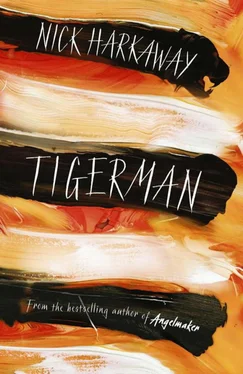
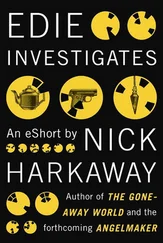
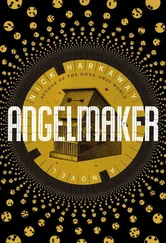
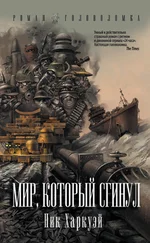


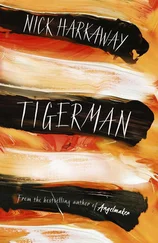
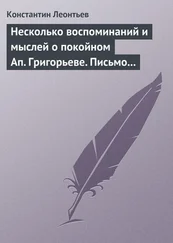
![Ник Харкуэй - Гномон [litres]](/books/400023/nik-harkuej-gnomon-litres-thumb.webp)
